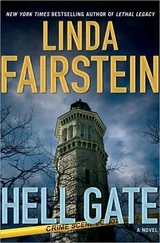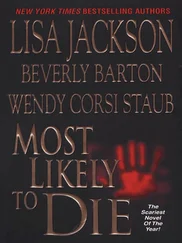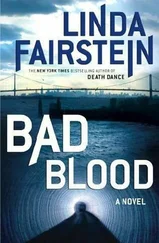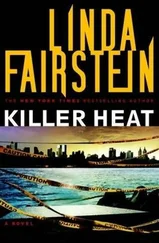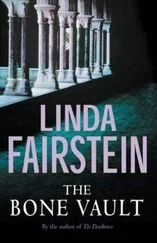“Anything new, Alex? C’mon inside.”
He had an amazing facility for doing four things at once. Not a word that I said would be missed or forgotten, while at the same time he would be scrutinizing a handful of the letters that Rose had just printed out for his approval and prioritizing the calls on two of his six telephone lines, which were blinking on hold as he led me in.
“You need to take those calls, Paul? I can wait.”
“Nah, the senator can call back later. He’s pressing me on that victims’ rights legislation, and I just like to keep him guessing. The other one will just take a minute. Sit.”
Battaglia pressed the clear Lucite button and resumed the conversation. “I’ve got her in here now. What do you need to know?” Pause. “Hold on.”
He looked up at me. “What do you know about Dogen’s husband and family?” Three similar questions followed, all innocuous.
I gave him the information I had, and wondered which newspaper he was favoring with it. He was a master at this, never giving out anything inappropriate, but serving up to a rotating group of reliables a couple of bites that would soon be available through ordinary channels. I listened as he controlled the conversation with ease and assurance. Something his caller said to flatter him caused him to break into a wide smile. I smiled, too, looking at his lean face, strong aquiline nose, and thick graying hair. The man was a genius at his dealings with the press.
“That ought to hold them for a while. Now, any leads I don’t know about?”
I told him what had gone on throughout the evening and what my plans were for the day.
“Y‘ know, nobody at the medical center is very happy with all the articles being printed about the security problems.”
“Well, Paul, you’ve got to admit-”
“Just try and keep a lid on these stories, Alex. People desperately in need of surgery and treatment are checking out like it was a leper colony. It’s not just Mid-Manhattan-I’m getting calls from Columbia-Presbyterian and Mount Sinai. You’d think they were writing about Grand Central Station or the Bowery Mission, not a medical center.
“And another thing, Pat McKinney was in right before you. Says Chief McGraw called him to gripe about something you did last night at the precinct.”
It figures that one asshole would find the other. And McKinney, one of my supervisors who welcomed any opportunity to embarrass me, ran right in here like a washerwoman to bad-mouth me to the D.A. I squirmed but held my tongue, knowing how much Battaglia hated infighting among his staff.
“All I can say, Alex, is that you must have been doing something right. McGraw’s a real pain in the neck. He crossed me twelve years ago, when he was commanding Manhattan South. He’s never been able to work with women-quite a Neanderthal. So don’t let him get to you.”
He stood up and walked in the direction of the door, marking an end to my audience. The cigar was clenched in his teeth and he was smiling even more broadly as he saw me out: “If he gives you a hard time, send my regards. Tell him I said he should zip up his pants and get out of your way.”
I picked up the messages that were stuffed into the clip on Laura’s desk, flipping through them until I found the one I wanted. David Mitchell had called back to confirm that he had made a referral of Maureen Forester to a neurologist affiliated with Mid-Manhattan Hospital. On the basis of her complaints to Mitchell and the results of his preliminary exam, he had recommended that she be admitted to the hospital Friday morning at 10A.M. Dr. Mitchell had insisted, of course, that no invasive tests or procedures be performed until his return to New York at the beginning of next week. Just observation and lots of rest.
I called Sarah to tell her the news and ask her if she could spend Friday afternoon “visiting” with Mo. Then I phoned Bergdorf’s personal shopping department and ordered a mocha-colored vicuña robe, to be delivered to the neurological floor the next day-“You’re our devil in disguise-stay well, with love from your pals-Mike, Mercer, and Al.”
Gina Brickner waited until I hung up the phone before she came in with her legal pads and a cassette recorder. She looked miserable.
“Laura told me you’re leaving at noon, but you gotta hear this tape before you go. I got an indictment on that Columbia University frat party rape last month. The 911 tape was just delivered this morning, with the printout.
“Jessie Pointer, the victim, told me she’d only had one or two beers that night. Said she was cold sober by the time she got back to her girlfriend’s dorm room to make the call. I played the tape-Alex, she’s so damn drunk that she’s hiccuping all the way through it.”
“Unbelievable.”
“It gets worse. Every time the 911 operator asks for a response address, Jessie can’t answer the question. She can’t remember the name of the dorm. Then the dispatcher wants the telephone callback number in case the address she finally came up with was wrong. Jessie gives her six digits, and then the two of them keep arguing over whether phone numbers have six or seven figures. I can’t believe how intox’d she sounds.”
“Get her back in here tomorrow. Read her the riot act. Make her listen to the tape. Tell her she’s got one chance-and only one chance-to correct her story. And she’ll have to admit to the jury, at the trial, that she wasn’t honest with you or with the cops about her condition.
“I’ll never understand why some of these women lie about the circumstances leading up to the attack but then expect us to believe that everything else they testify to is true. This isn’t a goddamn game-it’s people’s lives at stake. We’re here to help them, and they think we’re stupid enough not to know how to find out what really went on. If she wants us to salvage the rape case, every other detail she tells you has to be confirmed.”
Nothing infuriated me more than the real victims who compromised their own cases by trying to shade the events. The few who did it made everyone more skeptical of the scores of legitimate victims who followed in their footsteps.
By the time I had finished returning the calls and reassigning interviews, Mercer had arrived to pick me up.
“Beep if you need me, Laura. We’ll be at the morgue.”
MERCER WORKED HIS DEPARTMENT CAR around the yellow bobcats and backhoes at the construction site on First Avenue, a block south of the entrance to the blue and gray building that housed the office of the medical examiner. He parked at a meter after letting me out to climb over a curbside mound of frozen ice to get onto the sidewalk.
“Look at that fool,” Mercer said, pointing across the street at Chapman. “Man’s never owned a winter coat.”
Mike was coming from the deli across the street, seemingly oblivious to the bitter cold in his blazer and open-collared denim shirt.
I waved in his direction and he hoisted a large shopping bag, pointing to it as he called out to us, “Lunch.” Mercer looked at me and shook his head. Neither one of us was as at home in the morgue as Chapman. It was commonplace for members of his squad to be present for the autopsy procedure, while those of us who worked on sexual assault cases were fortunate enough to deal with survivors-wounded but living and breathing.
“Forget the front door,” Chapman shouted, as I started up the stairs to the building’s entrance. “C’mon. Kirschner’s still in the basement.”
I had never entered on the Thirtieth Street side so I followed Mike and Mercer around the corner and down the block to the parking bay where ambulance and emergency service trucks disgorged their bodies. A police officer checked our identification as he admitted us through the wide doors and we started down the sloping ramp toward the autopsy rooms.
Читать дальше

